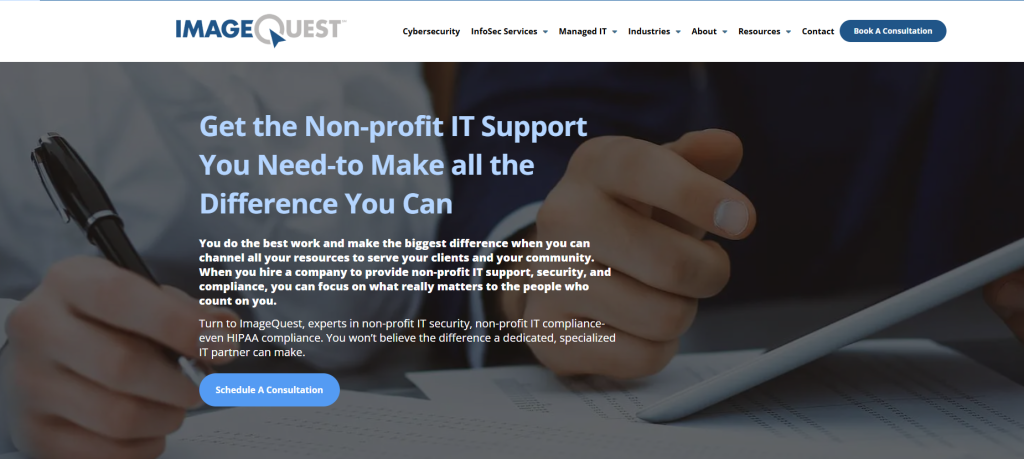Ensuring Security and Efficiency: A Guide to Nonprofit IT Compliance
For nonprofits managing operations and engaging with donors online, IT compliance is essential for safeguarding data and maintaining operational continuity. Nonprofit IT compliance includes practices that protect sensitive information, meet legal obligations, and strengthen public trust in the organization. By following IT compliance standards, nonprofits can secure donor data, financial records, and other confidential information, ensuring a safe, compliant environment.
Failing to adhere to compliance standards can lead to data breaches, legal issues, and reputational harm, making it essential for nonprofits to establish robust security practices from the outset.
Understanding Key Compliance Standards
Nonprofit organizations may need to comply with multiple regulatory standards based on the type of data they manage and their location. Key standards that affect nonprofit IT compliance include:
- HIPAA (Health Insurance Portability and Accountability Act): For nonprofits handling protected health information (PHI), HIPAA compliance is mandatory to ensure data privacy and security.
- GDPR (General Data Protection Regulation): Nonprofits with data from European Union citizens must adhere to GDPR guidelines, which focus on data privacy and individual rights.
- PCI-DSS (Payment Card Industry Data Security Standard): Nonprofits processing online donations are required to comply with PCI-DSS to safeguard payment information and prevent fraud.
- SOX (Sarbanes-Oxley Act): Nonprofits receiving federal funds or grants may need to meet SOX requirements, which focus on financial accountability and reporting transparency.
Understanding these standards helps nonprofits identify the compliance measures most relevant to their organization and establish a secure approach to data management.
Developing a Strong IT Compliance Program
A comprehensive IT compliance program is essential for nonprofits seeking to protect data and mitigate risks. This program should include policies, procedures, and controls designed to meet compliance standards while safeguarding digital assets. Key components of a robust compliance program include:
- Data Access Controls: Limit access to sensitive information by implementing multi-factor authentication (MFA) and role-based access controls to ensure that only authorized personnel can view or modify data.
- Regular Audits and Monitoring: Schedule audits to review compliance with IT standards. Monitoring systems can help detect and address vulnerabilities, ensuring data remains secure.
- Data Encryption: Encrypt sensitive data, both at rest and in transit, to protect information from unauthorized access, especially for health or financial data.
- Employee Training: Educate staff on compliance protocols and cybersecurity best practices. Consistent training helps team members understand their roles in maintaining compliance.
A well-defined compliance program allows nonprofits to create a secure environment, supporting both their mission and the privacy of stakeholders.
Managing Data Privacy and Donor Trust
Maintaining data privacy is crucial for nonprofits, particularly when managing sensitive donor information. Compliance standards like GDPR and PCI-DSS underscore the importance of data privacy, emphasizing the need for transparent practices and strong security controls. By implementing these measures, nonprofits can build trust with donors, showing a commitment to responsible data management.
Nonprofits should develop clear data privacy policies that outline how donor information is collected, stored, and used. Transparency in data practices can reassure donors about their information’s security, fostering trust and encouraging continued support.
Leveraging Technology for Efficient Compliance Management
Staying compliant can be challenging, especially for smaller nonprofits with limited resources. Leveraging technology can simplify compliance management, with tools like data encryption software, automated compliance checks, and monitoring systems to streamline the process.
Many compliance tools offer real-time reporting and monitoring, allowing nonprofits to detect and address security vulnerabilities promptly. Additionally, cloud-based platforms can improve data accessibility and security, helping nonprofits store and access information securely.
Partnering with IT Compliance Experts
For nonprofits lacking in-house IT expertise, working with IT compliance consultants is a valuable option. Compliance experts help organizations navigate complex regulations, assess security risks, and implement customized solutions. With professional guidance, nonprofits can achieve and maintain compliance with greater ease, allowing them to focus on advancing their mission.
Whether setting up secure data systems, configuring access controls, or ensuring compliance with specific regulations, IT compliance experts provide essential support to protect nonprofit data and operations.
Nonprofit IT compliance plays a critical role in protecting sensitive data, building donor trust, and supporting operational efficiency. By developing a comprehensive compliance program, adopting secure technology, and working with experienced consultants, nonprofits can achieve a safe, compliant environment that strengthens their mission. With the right strategies in place, organizations can meet regulatory standards confidently, setting a secure foundation for future growth and impact.
